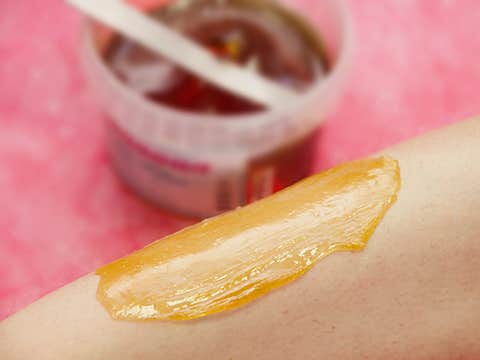Is Your Hair Removal Process Sanitary?
YT reveals the hair-raising truth about salon safety and cleanliness.

All the different & conflicting information about hair removal safety can be confusing enough to make you want to pull out your own hair! YT sat down with expert NormaJean Fusco, founder of NuFree, a botanical and organic hair removal treatment. Norma has spent 35 years dedicated to research and development of safer processes for getting rid of unwanted hair. Here, she bares all about hair removal hygiene. The truth is hair-raising to say the least!
What are some of the safety issues with hair-removal that people may not know about?
When a product sticks to skin and not just the hair (the way waxes and sugars do) you can cause very serious skin issues.
Specifically what kind of issues?
You can break up to 60% of the hairs and cause follicle damage or "distortion" that can create ingrown hairs or lead to a sebaceous oil problem. You can stretch the skin as well. It can also be more painful than a product like Nufree that sticks to the oil of the hair not the water of the skin.
What exactly is NuFree?
A hair-removal system made in the USA, which is similar to waxing, but it does not contain wax, honey or sugar, and is a self preserving antibacterial and antimicrobial. It's made of a proprietary combination of anhydrous (waterless) soya and soya products. It cannot be absorbed by the skin and does not have the sticky consistency of wax, which makes the process virtually painless. It's applied thinner than soft waxes, and uses a special strip to remove the hair but doesn't stick to your skin.
There’s a lot of hype about preservative-free or paraben-free beauty products. Are hair removal products or waxes that are preservative free the safest?
It is extremely important to have preservatives, bacteria and mold killers in a product. Staph infections are an extremely prevalent problem in this country.
How does your product, NuFree, protect against infections such as staph?
It is self-preserving, antibacterial, antimicrobial and anhydrous. This means nothing can grow inside the product, which can happen with ordinary waxes. Some people assume that changing applicators makes a wax sanitary but that does nothing to the product remaining in the heaters.
More juicy stories from YourTango:
- Should You Go Natural For Your Next Hair Removal Session?
- Your Most Embarrassing Hair Removal Questions -- Answered!
- Beauty Secrets: The Tricks Celebrities Don't Want You To Know
Speaking of applicators...what is the safest applicator a salon should use?
NuFree salons use medical grade staneless steel applicators that can be disinfected with each use. If a salon prefers to use wood, we require individually wrapped applicators made of hard wood provided by a medical company. We do not accept popsicle sticks or craft store applicators that are generally very cheap and soft. Furthermore, cloth and pelon strips can have additives, they can stretch and break the hair, and sometimes cause a bit of a reaction.
Besides using NuFree, how can the risk of infection be minimized?
I manufacture and recommend Finipil antiseptic which can be used after any hair removal except depilatory creams. It kills 99.9% of germs. Remember, when you pull a hair out of the body you can leave that follicle very prone to infection. If you burn yourself removing hair, same thing. Finipil cools the area rapidly and is also an antibacterial.
Are hair removal procedures regulated to make sure they are safe?
Cosmetology boards do not check individual products, only the category it is lumped into (i.e. waxing, hair cutting, etc.). They do have health department rules to ensure that the practitioners are "licensed" for the service they perform and the the equipment and salon is clean and sanitary. Nufree trains technicians and registers its salons and clinics to make sure they are performing and using all the required steps in the system for the highest level of safety.
What should consumers ask their hair removal technician before having a hair-removal procedure?
Ask where the products are made, check for a sanitary environment, and do some research to find out the effectiveness of the product. Just because a product says ‘all natural’ doesn’t mean it’s safe and doesn't mean it doesn't harm the hair shaft and bulb. A good salon will ask for certain medications or products that you are currently using and if you are seeing a medical doctor for any specific reason or treatment. The will also have you read and sign a form before any service.
Any other hair removal safety tips or tricks?
Do not hesitate to ask to have an inch done on your arm so you can see and feel the results and how the product reacts with your skin. Most professionals actually recommend you always do this first.
Find a NuFree/Finipil registered salon near you on Nufree.com

